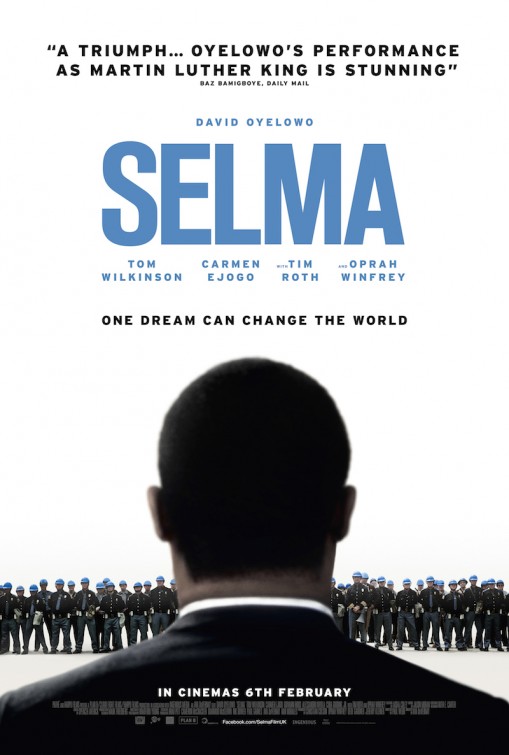 As you’ve likely heard already, Selma is a powerful film. See it.
As you’ve likely heard already, Selma is a powerful film. See it.- I cried a fair bit.
- The violence is palpable. Gunshots, people being gassed, the soggy crunch as truncheon strikes human beings, the murder of Jimmie Lee Jackson. The visceral brutality of the whites in power.
- Watching the film, I kept thinking Ferguson, Ferguson, FERGUSON! And all Ferguson has come to represent – not just Michael Brown, but Eric Garner, Tamir Rice, Ezell Ford, John Crawford, and all the people who have been murdered before and since. Militarized police attacking peaceful protesters: Alabama 1965 or Missouri 2014? So, when Common (who portrays James Bevel in the film) raps on his collaboration with John Legend (“Glory,” which plays at film’s end), “That’s why Rosa sat on the bus / That’s why we walk through Ferguson with our hands up,” I thought: yes. Exactly.
- Glad that it got an Oscar nomination for Best Picture, but how the heck does the Motion Picture Academy manage to overlook Ava DuVernay’s direction and David Oyelowo’s portrayal of Dr. King?
- Everyone ahead of me in line was buying tickets to American Sniper. Indeed, when the previews prior to Selma started, I was the only one in the Selma theatre. During those previews, however, five other people came. One of those five kept looking at his cell phone, so I think we can count four other attentive viewers.
- I don’t understand the controversy over the portrayal of LBJ. Of necessity, films will simplify. So, you’re not going to get a deeply nuanced, multi-volume Robert Caro biography here. What you get is a politician who, by the film’s conclusion, has decided to do the right thing – advocate for the Voting Rights Act, and side with Dr. King instead of Gov. Wallace. President Johnson was human; so was Dr. King. That humanity is part of what the film seeks to convey.
- It’s very moving. I left the theatre shaken.

Nicole Markotic
Philip Nel
Nicole Markotic
Philip Nel
Nicole Markotic
Philip Nel
Julie Barton